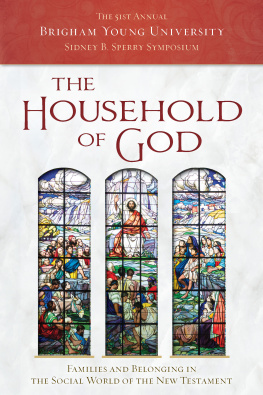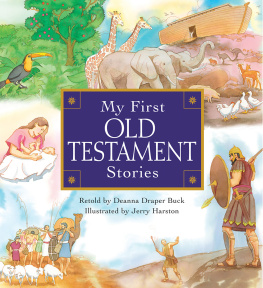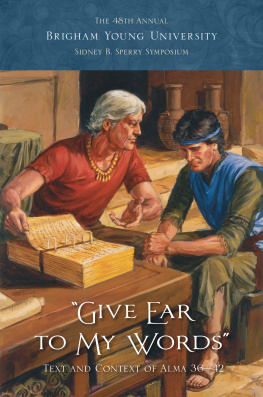Published by the Religious Studies Center, Brigham Young University, Provo, Utah, in cooperation with Deseret Book Company, Salt Lake City, Utah.
2022 by Brigham Young University. All rights reserved.
Printed in the United States of America by Sheridan Books, Inc.
Deseret Book is a registered trademark of Deseret Book Company.
Visit us at DeseretBook.com.
Any uses of this material beyond those allowed by the exemptions in US copyright law, such as section 107, Fair Use, and section 108, Library Copying, require the written permission of the publisher, Religious Studies Center, 185 HGB, Brigham Young University, Provo, UT 84602. The views expressed herein are the responsibility of the authors and do not necessarily represent the position of The Church of Jesus Christ of Latter-day Saints, Brigham Young University, or the Religious Studies Center.
Cover and interior design by Carmen Durland Cole
ISBN 978-1-9503-0434-9 | eISBN 978-1-64933-173-1 (eBook)
Library of Congress Cataloging-in-Publication Data
Names: Blumell, Lincoln H. (Lincoln Harris), 1975 editor. | Combs, Jason Robert, editor. | Ellison, Mark D., editor. | Judd, Frank F., Jr., editor. | Peek, Cecilia M., editor.
Title: The household of God : families and belonging in the social world of the New Testament / edited by Lincoln H. Blumell, Jason R. Combs, Mark D. Ellison, Frank F. Judd Jr., and Cecilia M. Peek.
Description: Provo, Utah : Religious Studies Center, Brigham Young University ; Salt Lake City, Utah : Deseret Book, [2022] | Includes index. | Summary: The related themes of households and families figure prominently in the New Testament. On occasions Jesus taught about marriage, divorce, and more general familial relations. Paul likewise preached about families, extended families, figurative families, and codes of conduct for those inhabiting the same household. Peter provided direction to the church regarding relations between husbands and wives and parents and children. James counseled church membership to treat one another as brothers and sisters. Jesus, Peter, and Paul also taught about the important contributions single members and widows make in the kingdom, and such household complexities as mixed-faith marriages. Thus, the New Testament contains much counsel for household conduct, familial relationships, and belonging to the household of God.Provided by publisher.
Identifiers: LCCN 2022015972 | ISBN 9781950304349 (hardcover)
Subjects: LCSH: FamiliesBiblical teaching. | Bible. New TestamentCriticism, interpretation, etc. | Sociology, Biblical. | Church of Jesus Christ of Latter-day SaintsDoctrines. | Mormon ChurchDoctrines.
Classification: LCC BS2545.F33 H68 2022 | DDC 225.8/3068dc23/eng/20220611
LC record available at https://lccn.loc.gov/2022015972
Contents
Introduction
The related themes of households and families figure prominently in the New Testament. On various occasions Jesus taught about marriage, divorce, and more general familial relations. Paul likewise preached about families, extended families, figurative families, and codes of conduct for those inhabiting the same household. Peter provided direction to the church regarding relations between husbands and wives and parents and children. James counseled church membership to treat one another as brothers and sisters. Jesus, Peter, and Paul also taught about the important contributions single members and widows make in the kingdom and such household complexities as mixed-faith marriages or relationships between slaves and masters. Thus, the New Testament contains much counsel on household conduct, familial relationships, and belonging to the household of God (Ephesians 2:19).
We are grateful for the good work of the Religious Studies Center team: Jared W. Ludlow, Devan Jensen, Annalyn Douglas, Sam Lambert, Erica Smith, Carmen Cole, and Brent Nordgren.
Lincoln H. Blumell
Jason R. Combs
Mark D. Ellison
Frank F. Judd Jr.
Cecilia M. Peek
Devan Jensen
Beverly Yellowhorse
2022 Sperry Symposium Committee
The Power of the New Testament in the Latter Days
Elder Kim B. Clark
I love the New Testament. It is a privilege to share with you thoughts and feelings about this miraculous book of scripture and its witness of the Lord Jesus Christ.
I have chosen to speak directly to those who are teaching the New Testament now and who will teach it in the coming year and in the years ahead. I have in mind parents who teach in the centers of gospel learning in their homes, those called to teach in the Church, and those who teach in seminary or in institute or in the Churchs universities.
The Prophecy of Joseph in Egypt
I begin with the prophecy the Lord gave to Joseph in Egypt recorded in 2 Nephi 3:621. The Lord promised that the Book of Mormon and the Old and New Testaments would have a significant impact in the latter days: Wherefore, the fruit of thy loins shall write; and the fruit of the loins of Judah shall write; and [they]... shall grow together, unto the confounding of false doctrines and laying down of contentions, and establishing peace among the fruit of thy loins, and bringing them to the knowledge of their fathers in the latter days, and also to the knowledge of my covenants, saith the Lord.
I want to focus on the phrase shall grow together and apply it especially to the New Testament, and the Book of Mormon. I believe one of the most important ways that growth occurs is through expanding our knowledge and understanding of Jesus Christ. When the scriptures grow together in our minds and heartsin us and those we teachthe love, light, and power of Jesus Christ will increase and be magnified in us.
We are the ones the Lord will bless to confound false doctrines, lay down contention, and establish peace. We are the ones to gather scattered Israel on both sides of the veil. If these scriptures grow together in us, the influence of the New Testament and the Book of Mormon in our lives and in the lives of the people we teach will increase, and these great scriptures will grow together in their reach all across the earth.
Like the Book of Mormon, the New Testament is, therefore, a book for our time. I felt that power of the New Testament in my first year as an undergraduate at Harvard. School was really difficult, but the Sabbath day was like an oasis. I often went to church very early and sat in the chapel to read. One Sabbath day I sat in the chapel and read these verses in the New Testament:
And why call ye me, Lord, Lord, and do not the things which I say?
Whosoever cometh to me, and heareth my sayings, and doeth them, I will shew you to whom he is like:
He is like a man which built an house, and digged deep, and laid the foundation on a rock: and when the flood arose, the stream beat vehemently upon that house, and could not shake it: for it was founded upon a rock.
But he that heareth, and doeth not, is like a man that without a foundation built an house upon the earth; against which the stream did beat vehemently, and immediately it fell; and the ruin of that house was great.
As I read, the words digged deep jumped off the page into my heart. Those words gave me a whole new perspective on coming unto Christ, hearing His words, and doing them. The man in the parable did not find a big rock and build his house on it. He had to find bedrock; he had to dig deep, and he had to anchor a strong foundation for his househis lifeon the rock of our Redeemer, as the Book of Mormon makes clear.








